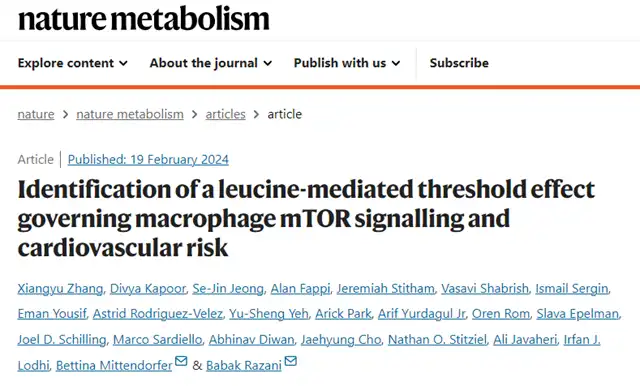High-Protein Diet Linked to Increased Cardiovascular Disease Risk
- Normal Liver Cells Found to Promote Cancer Metastasis to the Liver
- Nearly 80% Complete Remission: Breakthrough in ADC Anti-Tumor Treatment
- Vaccination Against Common Diseases May Prevent Dementia!
- New Alzheimer’s Disease (AD) Diagnosis and Staging Criteria
- Breakthrough in Alzheimer’s Disease: New Nasal Spray Halts Cognitive Decline by Targeting Toxic Protein
- Can the Tap Water at the Paris Olympics be Drunk Directly?
High-Protein Diet Linked to Increased Cardiovascular Disease Risk
- Should China be held legally responsible for the US’s $18 trillion COVID losses?
- CT Radiation Exposure Linked to Blood Cancer in Children and Adolescents
- FDA has mandated a top-level black box warning for all marketed CAR-T therapies
- Can people with high blood pressure eat peanuts?
- What is the difference between dopamine and dobutamine?
- How long can the patient live after heart stent surgery?
High-Protein Diet Linked to Increased Cardiovascular Disease Risk
Diet plays a crucial role in various chronic diseases, premature death, and healthy aging. In particular, protein intake is essential for maintaining health. High protein intake is common in Western societies and is often advocated as part of a healthy lifestyle, with the recommended protein intake for maintaining nitrogen balance being 0.8 grams per kilogram per day, accounting for about 11% of total energy needs. However, observational studies have shown an association between high protein intake and increased mortality from cardiovascular disease.
On February 19, 2024, researchers from the University of Pittsburgh School of Medicine published a study titled “Identification of a leucine-mediated threshold effect governing macrophage mTOR signalling and cardiovascular risk” in the journal “Nature Metabolism”.
The study suggests that a high-protein diet may increase the risk of atherosclerosis and promote cardiovascular disease. Human trials, mouse experiments, and cell experiments have found that consuming energy from protein exceeding 22% of total energy can lead to increased activation of immune cells, which accumulate in the blood vessel walls, leading to disease.

Additionally, the study found that leucine is a key activator of mTOR signaling in macrophages, disproportionately driving atherosclerosis. The research demonstrates the mechanism by which a high-protein diet has an adverse effect on the risk of cardiovascular disease.
In this study, researchers conducted two clinical trials to investigate the dose-response relationship between dietary protein consumption and amino acid-specific mTOR-autophagy pathways in human monocytes or macrophages.
In the first study, researchers examined the protein consumption limit by comparing the effects of diets containing 10% or 50% protein energy on mTORC1 pathway activation in monocytes. In the second study, participants received either a standard protein diet or a mixed diet with more protein (15% kcal or 22% kcal) in a more “real-world” setting.
The study focused on the CD14+, CD16- monocytes, which account for the largest proportion of circulating monocytes and are most likely to develop into atherosclerosis macrophages.
Furthermore, 14 overweight participants were analyzed in two surveys after a 12-hour overnight fast, consuming a low-protein diet (10% of energy from protein) or a high-protein diet (50% of energy from protein). Blood samples were collected before eating, 1 hour after eating, and 3 hours after eating to determine plasma amino acid concentrations and isolate monocytes.
The study found that acute high protein intake induces mutual inhibition of monocyte mTORC1 activation and autophagy.
The second experiment found that only protein intakes of 25 grams or more per meal could activate mTOR and have functional effects. Consuming energy from protein exceeding 22% of total energy triggered harmful amino acid-mTORC1-autophagy signaling pathways in human monocytes and macrophages, leading to atherosclerosis in male mice.
Finally, the study also found that leucine is the primary activator of mTOR signaling in macrophages, and compared to 0.8 grams per kilogram per day of protein, 1.6 grams per kilogram per day of protein can lead to higher mTORC1 activation.
The study found a close association between high protein intake and the risk of atherosclerotic cardiovascular disease, suggesting possibilities for dietary advice and therapeutic measures. The research indicates that increasing leucine in the diet is necessary and sufficient to induce atherosclerosis-promoting effects of high-protein diets in the body.
The researchers stated that they hope this study will spark a discussion on how to change diets in a precise manner to influence body functions at the molecular level and reduce the risk of disease.
In conclusion, the results suggest that a high-protein diet, especially through increased plasma leucine, may inhibit mTORC1-mediated autophagy in monocytes and macrophages, leading to the formation of atherosclerosis.
Consuming energy from protein exceeding 22% of total energy has a negative impact on macrophages responsible for clearing cellular debris, leading to the accumulation of these cells in the blood vessel walls, resulting in atherosclerosis.
Link to the paper:
https://doi.org/10.1038/s42255-024-00984-2
High-Protein Diet Linked to Increased Cardiovascular Disease Risk
(source:internet, reference only)
Disclaimer of medicaltrend.org
Important Note: The information provided is for informational purposes only and should not be considered as medical advice.



